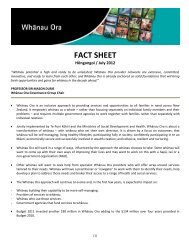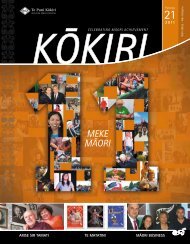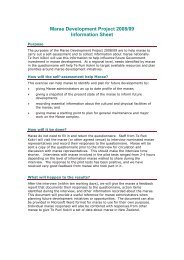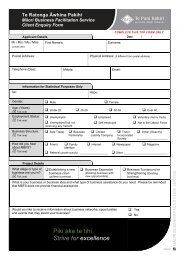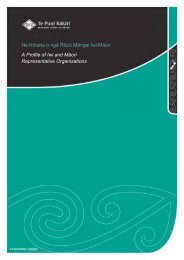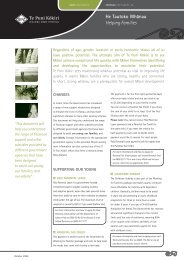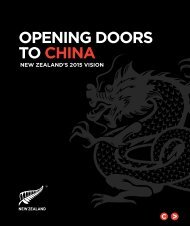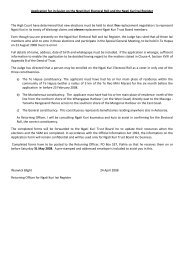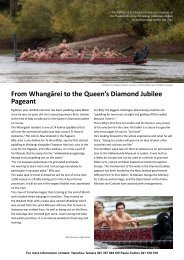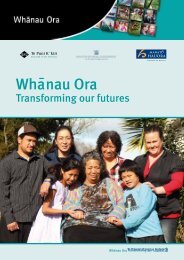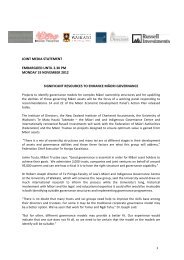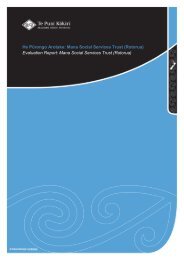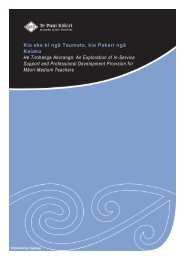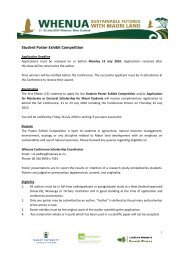Download the PDF (6.0MB) - Te Puni Kokiri
Download the PDF (6.0MB) - Te Puni Kokiri
Download the PDF (6.0MB) - Te Puni Kokiri
Create successful ePaper yourself
Turn your PDF publications into a flip-book with our unique Google optimized e-Paper software.
Initially carpentry was <strong>the</strong> only<br />
trade offered. Due to <strong>the</strong> scheme’s<br />
success, plumbing, electrical<br />
wiring, mechanics, painting, panel<br />
beating, plastering, welding,<br />
engineering, boiler making,<br />
fi tting and more were offered to<br />
encourage Mäori into long-term<br />
skilled employment.<br />
“The success of <strong>the</strong> scheme<br />
was due in no small measure to<br />
placing <strong>the</strong> trainees in hostels<br />
where <strong>the</strong>y received <strong>the</strong> benefi t<br />
of close, friendly supervision and<br />
helpful advice and guidance,”<br />
says Barry Baker from <strong>the</strong><br />
Department of Mäori Affairs.<br />
There were four hostels in<br />
Tämaki Makaurau, one in<br />
Lower Hutt at <strong>the</strong> Trentham<br />
Immigration Hostel and two<br />
hostels, in Ötautahi (Rehua and<br />
<strong>Te</strong> Kaihanga).<br />
“The Department of Mäori Affairs<br />
was well aware in <strong>the</strong> 60s and<br />
70s of <strong>the</strong> large number of Mäori<br />
in unskilled employment, and had<br />
taken positive steps to change<br />
<strong>the</strong> situation. It was evident that<br />
<strong>the</strong>se trade training schemes<br />
were making a signifi cant and<br />
important contribution to <strong>the</strong><br />
industrial development of <strong>the</strong><br />
nation, and to <strong>the</strong> place of<br />
Mäori in modern society,” says<br />
Barry Baker.<br />
In <strong>the</strong> middle of 1960, 15-yearold<br />
Don Tawhai of Ngäti<br />
Kahungunu left his home in<br />
Hastings to travel to Ötautahi<br />
to take part in <strong>the</strong> Mäori Trade<br />
Training Scheme.<br />
Earlier that year Don’s mum<br />
met with <strong>the</strong> Department’s<br />
Mäori Welfare Offi cer for<br />
Hawke’s Bay, Boy Tomoana,<br />
who suggested to her that Don<br />
should enrol in <strong>the</strong> Mäori Trade<br />
Training Scheme and go to<br />
Ötautahi to get his “ticket”.<br />
“At fi rst it was a bit daunting<br />
because I had never been out<br />
of Hastings and I was off to<br />
<strong>the</strong> big smoke to get my ticket,”<br />
says Don.<br />
KAUPAPA MATUA<br />
“I was met at <strong>the</strong> train station<br />
by <strong>the</strong> head boys of <strong>the</strong> Rehua<br />
Hostel, Noel Huata and Ben<br />
Hawkins, and <strong>the</strong>y assured me<br />
that I would be alright. I got to<br />
<strong>the</strong> hostel and <strong>the</strong>y introduced<br />
me to <strong>the</strong> boys,” he says.<br />
“The next day I met my fi rst boss<br />
and started my apprenticeship<br />
in carpentry and I never<br />
really looked back. Although I<br />
remember feeling alone at fi rst,<br />
I realised that I wasn’t <strong>the</strong> only<br />
one and that all <strong>the</strong> boys were<br />
in <strong>the</strong> same boat and <strong>the</strong>y ended<br />
up being my whänau.”<br />
Once Don had fi nished his<br />
10,000 hours (about fi ve years)<br />
in <strong>the</strong> scheme and got his<br />
ticket he became a whänau<br />
role model and consequently<br />
his three bro<strong>the</strong>rs followed in<br />
his footsteps by enrolling in<br />
<strong>the</strong> scheme and successfully<br />
completing it too.<br />
In <strong>the</strong> 1980s, armed with his<br />
ticket and more than 20 years’<br />
experience in <strong>the</strong> building<br />
industry, Don and one of his<br />
bro<strong>the</strong>rs started <strong>the</strong>ir own<br />
business, Multiple Construction,<br />
in Auckland, employing more<br />
than 30 workers including a<br />
couple of Mäori Trade Trainees.<br />
In <strong>the</strong> late 80s <strong>the</strong> recession<br />
set in and forced Multiple<br />
Construction out of business.<br />
“We shut up shop because<br />
developers had run out of<br />
money, but even though our<br />
business closed we found o<strong>the</strong>r<br />
work and business opportunities<br />
to ride out <strong>the</strong> recession,”<br />
says Don.<br />
Now 65 years old, Don is still<br />
living in Christchurch with his<br />
“The Mäori Trade<br />
Training was <strong>the</strong> best<br />
thing I ever did. It<br />
saved my life because<br />
what would I have<br />
been doing o<strong>the</strong>rwise<br />
– I might have been in<br />
jail and just ano<strong>the</strong>r<br />
Mäori statistic but I<br />
chose to help build<br />
this nation with my<br />
hands.”<br />
wife of more than 45 years.<br />
They have three children and<br />
six mokopuna.<br />
Now with 50 years in <strong>the</strong><br />
building industry and full of<br />
life experience running his own<br />
contracting business, Don has<br />
often wondered why <strong>the</strong> Mäori<br />
Trade Training Scheme stopped.<br />
“The Mäori Trade Training was<br />
<strong>the</strong> best thing I ever did. It saved<br />
my life because what would I<br />
have been doing o<strong>the</strong>rwise – I<br />
might have been in jail and just<br />
ano<strong>the</strong>r Mäori statistic but I<br />
chose to help build this nation<br />
with my hands,” says Don.<br />
In <strong>the</strong> beginning of 1961 a<br />
15-year-old Norm Dewes (Ngäti<br />
Kahungunu) from Wairoa moved<br />
into <strong>the</strong> Rehua Hostel and<br />
quickly became mates with Don.<br />
Norm’s trade saw him in <strong>the</strong><br />
foundry melting heavy metal<br />
including iron and steel. “It was<br />
a fantastic opportunity and like<br />
Don it also set me up for life. I<br />
didn’t quite get <strong>the</strong> opportunity<br />
to melt gold but I did melt<br />
pennies,” laughs Norm.<br />
TE PUNI KÖKIRI | KÖKIRI | PIPIRI – HÖNGONGOI 2009<br />
11



